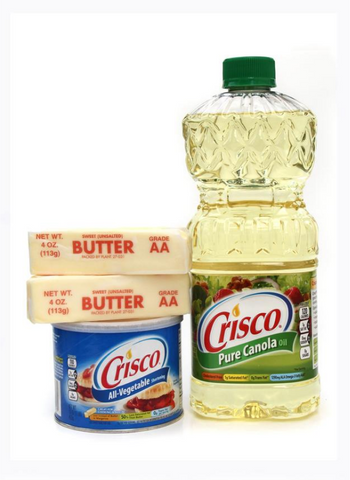Introduction
Experts have identified various dietary culprits that could explain the increasing rates of chronic disease in developed nations. Interestingly, there is a particular food that is widely incorporated into the diets of millions, yet it has been relatively understudied as a possible contributor to these health issues—namely, industrial seed oils and vegetable oils.The terms "seed oil" and "vegetable oil" are often used interchangeably, but they can have slightly different meanings depending on the context. In general, both seed oils and vegetable oils are plant-based oils extracted from seeds, fruits, or other parts of plants. Here's a breakdown of the differences:
- Seed Oil - Seed oil specifically refers to oils that are extracted from the seeds of plants. Seeds can include those from fruits (e.g., sunflower seeds), grains (e.g., corn), or other plant structures.
- Examples - Sunflower oil, safflower oil, corn oil, soybean oil, and canola oil are all considered seed oils since they are derived from the seeds of their respective plants.
- Vegetable Oil - Vegetable oil is a more general term that encompasses a broader range of plant-based oils. While it can include oils from seeds, it can also include oils from fruits, nuts, and other plant parts.
- Examples - In addition to seed oils, vegetable oil may include oils like olive oil (from olives), coconut oil (from the fruit of the coconut palm), and palm oil (from the fruit of the oil palm).

A 2019 report from the American Heart Association (AHA) revealed that nearly half of American adults have cardiovascular disease, which includes conditions like atherosclerosis, high blood pressure, and heart failure (1). As a result, many individuals are seeking guidance on how to support their heart health through their diets and exercise. Unfortunately, the mainstream medical community's dietary advice for cardiovascular health is outdated. One particularly misguided recommendation is to increase consumption of "heart-healthy" seed and vegetable oils. However, the question remains: Is it truly beneficial to include seed oils in a heart-healthy diet?

Oils like corn oil, cottonseed oil, rapeseed/canola oil, soybean oil, sunflower oil, and safflower oil, commonly known as "industrial seed oils," represent relatively recent additions to our diet, emerging with the rise of the modern food processing industry in the late 19th century. In the United States, the consumption of these widely used seed oils experienced a remarkable 1,000-fold increase between 1909 and 1999 (2). This surge in seed oil intake is partly due to their prevalence in processed foods, which make up a significant portion of the average American diet. Furthermore, medical authorities like the AHA, the Harvard School of Public Health, and The Cleveland Clinic have actively encouraged the consumption of vegetable and seed oils.
The push for increased consumption of "heart-healthy" vegetable and seed oils is a result of the "diet-heart hypothesis" first introduced by physiologist Ancel Keys in the 1950s. However, Keys' conclusion regarding the role of dietary saturated fat and cholesterol in causing cardiovascular disease was based on low-quality research with many methodological flaws. Despite this, Keys recommended replacing dietary saturated fat with seed oils rich in omega-6 fatty acids, derived from cottonseed, corn oil, canola oil, safflower, sunflower oils and soybeans.
What makes this recommendation interesting is that it aligned with the growing seed oil industry's agenda. The industry was seeking a viable way to use surplus oil seeds that were abundant in omega-6 fatty acids, particularly cottonseed. The conversion of cottonseed into a cooking oil became a profitable solution for utilizing these surplus agricultural resources.

Additionally, the endorsement of vegetable and seed oils as "heart-healthy" was heavily influenced by significant financial support from Procter & Gamble, the makers of Crisco, a cottonseed oil-based product. This financial infusion into the newly established American Heart Association (AHA) in the 1940s led to widespread medical support for vegetable oils. Unfortunately, this misinformation campaign gained momentum and resulted in the misguided advice to consume highly processed, industrialized seed oils. In today's food market, it is common to find oils like safflower, sunflower, canola, and corn oils incorporated into a wide range of simple processed to ultra-processed foods (3).

Cincinnati - Procter & Gamble Corporate Headquarters. P&G is an American Multinational Consumer Goods Company
Health Risks of Unhealthy Cooking Oils
Industrial vegetable/seed oils can negatively affect our well-being, particularly when we consume them in large quantities or use them in unsuitable ways. Oils with a high concentration of omega-6 fatty acids, including safflower, sunflower, canola and corn oils, can upset the omega-6 to omega-3 ratio in the body. An imbalance can promote inflammation (4) and is associated with chronic diseases like infertility (5), macular degeneration (6), mental health disorders (7), irritable bowel syndrome (IBS) and inflammatory bowel disease (IBD) (8)(9), autoimmune conditions (10), arthritis (11) and cardiovascular diseases (12). Furthermore, the intense processing methods these oils undergo—such as chemical extraction, bleaching, and deodorizing—may reduce their nutritional quality and introduce unwanted chemicals.
Cooking safflower, sunflower, canola and corn oils at high temperatures poses further health concerns. Oils that are not heat-stable can form harmful compounds, such as acrylamide and polycyclic aromatic hydrocarbons (PAHs), which are associated with the risk of cancer. Polyunsaturated fats are more susceptible to oxidation than their saturated counterparts. Repeated use of these oils for frying, which is common in some food service environments, can perpetuate the formation of harmful free radicals. When industrial seed oils are exposed to certain conditions, they can produce two harmful substances known as trans fats and lipid peroxides.

Trans fats are notorious for their involvement in the development of cardiovascular disease and type 2 diabetes. In fact, every 2 percent increase in calories from trans fats raises the risk of heart disease by nearly double (13). On the other hand, lipid peroxides are toxic byproducts that cause damage to DNA, proteins, and lipids found in cell membranes throughout the body. The accumulation of lipid peroxides can contribute to the aging process and the development of chronic diseases. In the past, partial hydrogenation was a prevalent method to enhance the stability and texture of oils, often resulting in the creation of trans fats. However, since the dangers of trans fats to heart health have emerged, many countries and products have reduced or eliminated these practices.


Eliminating Unhealthy Cooking Oils From Your Diet
To eliminate industrial seed oils from your diet, start by clearing out your pantry and discarding any bottles labeled with canola oil, corn oil, cottonseed oil, soybean oil, sunflower oil, and safflower oil. These oils are not generally considered "healthy."
The next step is to steer clear of processed foods, as they often contain significant amounts of industrial seed oils. Additionally, try to reduce your consumption of restaurant-prepared meals, as they are typically cooked using repeatedly heated industrial seed oils.
Lastly, minimizing your consumption of grain-fed meat, to the best of your ability. There is evidence to suggest that animals fed with grains may accumulate the toxic byproducts of industrial seed oils, which comprise a large portion of their diet, within their meat. By avoiding grain-fed meat, you can potentially reduce your intake of lipid peroxides and other harmful byproducts associated with industrial seed oils.
Choosing Healthier Oils
If your aim is to achieve optimum health, it is advisable to exclude industrial seed oils from your diet. Instead, consider cooking with traditional animal fats. Not all cooking oils carry these health concerns. Oils that are praised as ‘good fats’ and can support heart health and contribute to a balanced diet.
- Grass-fed Butter: If you can tolerate dairy, incorporating butter into your diet can be beneficial. Butter and ghee derived from grass-fed animals contain conjugated linoleic acid, a type of fatty acid known for its anti-cancer and metabolic health-promoting properties. Grass-fed butter is primarily praised for its saturated fat content. It also contains monounsaturated fats and is also valued for its content of other nutrients such as vitamin K2 and omega-3 fatty acids, especially when compared to regular butter from cows fed with grain.

- Ghee Butter: Ghee, like grass-fed butter, is also high in saturated fats and also contains monounsaturated fats. It's clarified butter, which means the milk solids have been removed, making it suitable for those who are lactose intolerant. Ghee is often valued for its cooking properties and potential health benefits associated with the vitamins it contains.
- Grass-fed Beef Tallow: Tallow refers to the fat that is obtained from beef and bison. It has a high smoke point, which makes it an excellent choice for high-heat cooking methods. It is interesting to note that until the 1970s, many restaurants used tallow in their deep fryers. However, the rise of the industrial seed oil industry subsequently replaced traditional fats in our diets.
- Coconut Oil: Coconut oil has been praised for its MCT content and saturated fats. Coconut oil is considered a superfood due to its numerous health benefits. It contains medium-chain triglycerides, including lauric acid, which is a type of fatty acid that the body can quickly utilize for energy. Lauric acid is also known for its antifungal, antibacterial, and antiviral properties. Additionally, coconut oil has a high saturated fat content of around 90 percent, making it highly heat stable for cooking purposes.
- Pastured Lard: Pastured lard is obtained from pork and primarily composed of monounsaturated fat. This type of fat has long been promoted as "heart healthy" by the mainstream medical community. Surprisingly, lard, which is derived from pigs, despite being high in saturated fat, can serve as a suitable substitute for butter in recipes if dairy is not an option for you.
- Duck Fat: Duck fat is a wonderfully flavorful traditional cooking oil that offers great versatility in the kitchen. It boasts a high smoke point, which makes it an excellent choice for high-heat cooking methods. Despite its ability to withstand heat, duck fat also offers a delicate flavor further enhancing its appeal and usability in various culinary applications.
If optimizing your health is your goal, it is recommended to avoid industrial seed oils and opt for these traditional animal fats during cooking. Our overall health is influenced by our diet and lifestyle choices. By following this approach, you can strive for a more well-rounded and healthful dietary routine.
It's worth noting that when selecting animal fats for cooking purposes, it is advisable to choose 100% grass-fed or pasture-raised sources. Conventional alternatives tend to have significantly higher levels of omega-6 fatty acids. By opting for 100% grass-fed or pasture-raised animal fats, you can help maintain a more balanced intake of these essential fatty acids.

Movement Optimization with Functional Patterns
If your aim is to maintain a healthy and pain-free lifestyle well into your 60s, 70s, and beyond, integrating Functional Patterns into your routine is essential. By following the foundational principles of Functional Patterns, you can establish a sustainable approach to enhancing functional strength and ensure graceful aging. However, it's crucial to acknowledge the significance of our dietary choices in supporting FP. In addition to enhancing movement efficiency, good biomechanics also contribute to effective digestion and overall well-being. Just as our movements must adapt to various stresses, our dietary preferences should also adapt to our changing physiological needs.
It is essential to understand the correlation between abdominal distention and bloating due to the consumption of unhealthy cooking oils and grains. It is also important to note that diet is just one component of the overall picture. The primary objective is always to ensure that our dietary choices enhance our biomechanics and digestion, reinforcing the core goal of functional efficiency in FP.
Conclusion
In conclusion, recognizing the potential role that seed and vegetable oils have in chronic diseases is crucial. Clearing your pantry of canola, corn, cottonseed, soybean, sunflower, safflower, and peanut oils, along with reducing processed food and restaurant meals, can mitigate risks. Opting for healthier cooking oils like 100% grass-fed butter and ghee, grass-fed beef tallow, coconut oil, pastured lard, and duck fat supports overall health.
When incorporating Functional Patterns, acknowledging the impact of dietary choices is essential for optimal health, pain-free aging, and improved wellness.
By aligning both movement and nutrition choices, you can enhance digestion, leading to optimal food absorption. As a result, this facilitates improved recovery, creating more strength and resiliency.
References:
- Heart Disease and Stroke Statistics—2020 Update: A Report From the American Heart Association https://ahajournals.org/doi/10.1161/CIR.0000000000000757
- Changes in consumption of omega-3 and omega-6 fatty acids in the United States during the 20th century - https://pubmed.ncbi.nlm.nih.gov/21367944/
- https://chriskresser.com/how-industrial-seed-oils-are-making-us-sick/
- Home use of vegetable oils, markers of systemic inflammation, and endothelial dysfunction among women - https://pubmed.ncbi.nlm.nih.gov/18842776/
- Relationship of omega-3 and omega-6 fatty acids with semen characteristics, and anti-oxidant status of seminal plasma: A comparison between fertile and infertile men https://www.sciencedirect.com/science/article/abs/pii/S0261561409001587
- Dietary fat and risk for advanced age-related macular degeneration - https://pubmed.ncbi.nlm.nih.gov/11483088/
- Effect of High Ratio of n-6/n-3 PUFAs on Depression: A Meta-Analysis of Prospective Studies - https://www.ncbi.nlm.nih.gov/pmc/articles/PMC9164255/
- Marked elevations in pro-inflammatory polyunsaturated fatty acid metabolites in females with irritable bowel syndrome - https://www.ncbi.nlm.nih.gov/pmc/articles/PMC2853445/
- A host-microbiome interaction mediates the opposing effects of omega-6 and omega-3 fatty acids on metabolic endotoxemia - https://pubmed.ncbi.nlm.nih.gov/26062993/
- Dietary lipids and risk of autoimmune disease - https://pubmed.ncbi.nlm.nih.gov/8050192/
- Omega-6 vegetable oils as a driver of coronary heart disease: the oxidized linoleic acid hypothesis - https://openheart.bmj.com/content/5/2/e000898
- Health Implications of High Dietary Omega-6 Polyunsaturated Fatty Acids - https://www.ncbi.nlm.nih.gov/pmc/articles/PMC3335257/
- Dietary fat intake and the risk of coronary heart disease in women - https://pubmed.ncbi.nlm.nih.gov/9366580/







